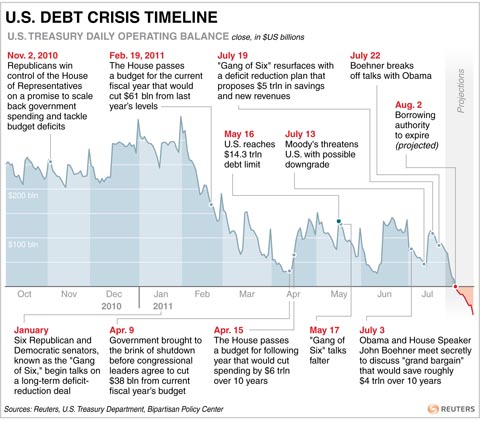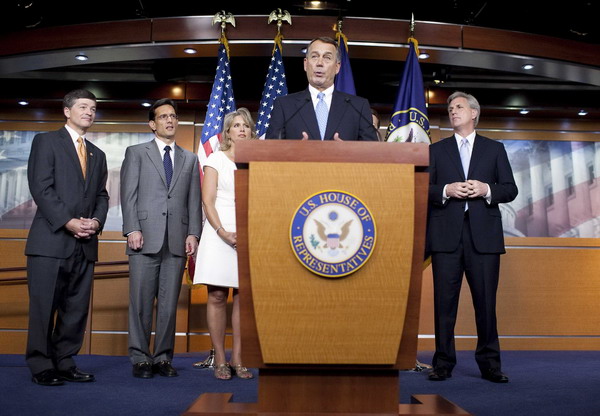Photos
Vote delayed on US debt bill as default date looms
Updated: 2011-07-29 11:15
(Agencies)
|
 Charts US Treasury daily balance with pointers to key dates in debt crisis talks. [Photo/Agencies]
|
With the measure short of as many as four votes, according to aides, the Republican-led House of Representatives abruptly delayed a vote as Speaker John Boehner struggled to overcome objections from conservative rebels in his own party.
Republican Representative Mick Mulvaney, a supporter of the Tea Party movement that demands even deeper spending cuts, said he still would vote against the bill as he left Boehner's office to pray at the congressional chapel.
"I'm still a no," he said.
World markets, unnerved by the risk of a US default or credit downgrade, watched anxiously. The US stock market's broad S&P 500 index fell for a fourth day and interest rates soared on some Treasury bills that mature in August.
International Monetary Fund chief Christine Lagarde warned of the risks of Congress failing to raise the $14.3 trillion debt ceiling, which would mean the US government runs out of money to pay all of its bills after August 2.
"One of the consequences could be a decline of the dollar as a reserve currency and a dent in people's confidence in the dollar," Lagarde told PBS NewsHour in an interview.
US financial executives added their voices to calls from the business community for Congress to strike a deal that would banish the specter of default.
|
 Speaker of the House John Boehner (D-OH) speaks during a news conference on Capitol Hill in Washington July 28, 2011. With him from left are Jeb Henserling (R-TX), House Majority Leader Eric Cantor (R-VA), Renee Ellmers (R-NC) and House Majority Whip Kevin McCarthy (R-CA). [Photo/Agencies]
|
"A whole new stage"
Once the House acts one way or the other, action will move to the Democratic-controlled Senate. Boehner's plan is doomed in the Senate, where Democratic Leader Harry Reid is pushing his own deficit-reduction plan.
But after both chambers have their say, frantic talks are expected this weekend to seek a compromise to permit a vote on raising the debt ceiling and staving off a default on Tuesday.
"I think there will be a whole new stage of the Senate and House having to come together to avoid August 2nd as being a day that has never happened in the US," White House chief of staff William Daley told CNN.
Republican leaders were engaged in a final round of arm-twisting as they tried to secure the 217 votes needed to pass the bill in the House and avoid a humiliating defeat.
After the House vote was delayed just minutes before it was due to take place, a stream of lawmakers who had decided to vote against the plan came and went from Boehner's office.
Whatever was said in his office did not appear to be changing many minds.
Republican Representatives Louie Gohmert and Joe Walsh said they would still vote against the bill. Trent Franks and Jeff Flake would not say where they stood.
Boehner's plan would pair about $900 billion in cuts with a short-term debt ceiling increase. Lawmakers would have to come up with further spending cuts to raise the debt ceiling again in several months.
Reid's plan, backed by Democratic President Barack Obama, would cut $2.2 trillion from the deficit over 10 years without raising taxes and extend the debt ceiling through 2012.
Obama's priority was to "lift the cloud and make sure that the United States does not default," White House spokesman Jay Carney told reporters, urging Congress to end its partisan battle and deliver a compromise deal.
The House vote was originally scheduled for between 5:45 pm and 6:15 pm EDT (2145 and 2215 GMT). No new time was set for a vote later on Thursday.
Despite the gridlock, Congress could kick into higher gear as pressure to reach a deal mounts ahead of next Tuesday.
A failure to raise the debt limit by then could trigger a payments crunch that would shake the global financial system and could tip the United States back into recession.
"The markets are going to be on tenterhooks until we get an understanding of what the quality of the package is," said Kevin Caron, market strategist at Stifel, Nicolaus & Co.
White House senior adviser Valerie Jarrett said the Treasury secretary would face very difficult decisions if the deadline is not met.
"Do we say to our servicemen and women serving abroad that we're not going to pay them and support their families? Do we say to the 70 million, 80 million people who receive Social Security that we're not going to pay them?" she said. "Or small businesses who are vendors of the United States government?"

Specials

Wen pledges 'open' probe
Design flaws in the signal equipment led to Saturday's fatal high-speed train collision, authorities say.

Turning up the heat
Traditional Chinese medicine using moxa, or mugwort herb, is once again becoming fashionable

Ciao, Yao
Yao Ming announced his retirement from basketball, staging an emotional end to a glorious career.